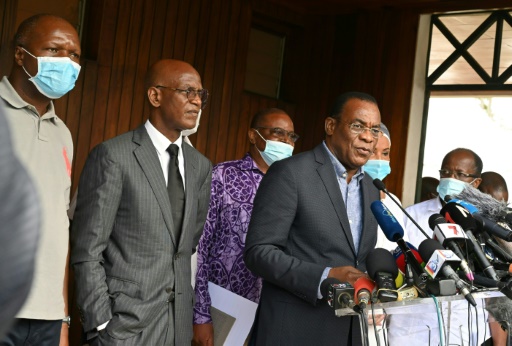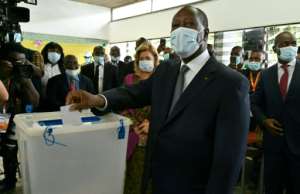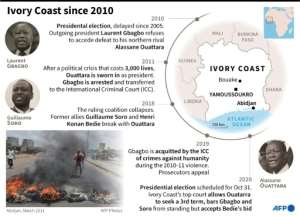
[ad_1]
Opposition leaders in Côte d’Ivoire said on Monday they were creating a “transitional government” after boycotting a weekend election in protest of President Alassane Ouattara’s candidacy for a contested third term.
The move deepened a crisis that erupted in August when Ouattara said he would run again, to the fury of the opposition, calling it a constitutional violation and an “electoral coup” in the West African country.
The opposition’s announcement came as officials were counting the results of Saturday’s elections with a preliminary tally that showed Ouattara with a strong lead, as expected after the opposition boycott.
Pre-election clashes killed at least 30 and opposition protests stoked fears of a repeat of the 2010-2011 crisis, when 3,000 people died after then-President Laurent Gbagbo refused to accept Ouattara’s defeat.
“The opposition parties and groups announce the creation of a national transition council,” Pascal Affi N’Guessan told reporters. “The mission of this council will be … to create a transitional government in the next few hours.”
“The mission of the national transition council will be to prepare the framework for a fair, transparent and inclusive presidential election,” said N’Guessan.
“Keeping Mr. Ouattara as head of state could lead to civil war,” he added.
There was no immediate response from the government on the latest announcement from the opposition.
The streets of Abidjan were almost deserted on Monday night.
 Current Ivory Coast President Alassane Ouattara announced that he would run again in August. By Issouf SANOGO (AFP)
Current Ivory Coast President Alassane Ouattara announced that he would run again in August. By Issouf SANOGO (AFP) Activists and residents said that shots or small detonations were fired outside the houses of two opposition leaders in the city, although no one was injured.
Opposition figures had already rejected Saturday’s vote as a failure and called for a “civil transition” from Ouattara, prompting a warning from his ruling party against trying to provoke unrest.
N’Guessan said the transition council would be led by veteran opponent Henri Konan Bedie, 86, a former president and longtime opponent of Ouattara.
A former IMF economist, the Ivory Coast leader is praised by his supporters for bringing infrastructure projects and economic growth after a decade of instability at the world’s leading cocoa producer.
But the anger sparked by his third term has revived memories of Ivory Coast’s past fights with roots even before a 2002 civil war split the country in two.
The tension in the main French-speaking West African economy is another test for a region where Guinea is mired in a post-election spat of its own, Nigeria is emerging from widespread unrest and Mali has faced a coup.
Electoral riots
The outbreaks of rioting, some vandalized voting materials and closed polling stations were mostly recorded in opposition strongholds during Saturday’s elections.
 Political turmoil in Côte d’Ivoire since the controversial 2010 presidential elections. By Gillian HANDYSIDE (AFP)
Political turmoil in Côte d’Ivoire since the controversial 2010 presidential elections. By Gillian HANDYSIDE (AFP) But rival factions gave conflicting accounts of the boycott’s scope. The government called them isolated.
Residents said four more people had been killed Sunday in central Toumodi when houses were burned down in clashes between neighboring ethnic communities that back rival political factions.
At least five people were killed in clashes on Saturday.
An African Union observation mission said Monday that the election was “generally successful” despite a lack of consensus.
In contrast, the US watchdog Carter Center said “the overall context and process did not allow for a genuinely competitive election.”
“The process excluded various political forces from Côte d’Ivoire and was hampered by an active boycott,” he said in a statement issued with the South African-based Electoral Institute for Sustainable Democracy in Africa (EISA).
Ouattara, 78, had said after his second term that he planned to usher in a new generation, but the sudden death of his chosen successor prompted him to seek a third term.
He says a constitutional court ruling approved his third term, allowing him to restore the country’s two-term presidential limit thanks to a 2016 reform.
When the Ivory Coast emerged from the civil war after 2002, the country was divided in two, the north in the hands of the rebels and the south by the forces of then-President Gbagbo.
Ouattara won a long-postponed election in 2010, although Gbagbo refused to accept defeat. French forces eventually intervened to help Ouattara loyalists overthrow the former president.